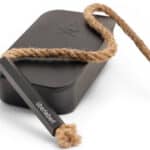Have you ever wondered about that old bag stashed in your bathroom cabinet? Do Epsom salts expire? Interestingly, Epsom salt doesn’t truly expire despite an expiration date on the packaging.
This article will dive deep into the world of Epsom salts, explaining why they don’t really expire and how to store them for longevity. Prepare to be enlightened as we unlock the enduring mystery of Epsom salt’s shelf life!
Key Takeaways
- Epsom salts do not truly expire and can be used safely and effectively even after the expiration date on the packaging.
- The expiration date on Epsom salt packaging is more of a legal requirement than an indication of spoilage. It does not affect the safety or effectiveness of the product.
- Proper storage is key to maintaining the potency of Epsom salt. Keep it dry and dark, away from moisture, light, and contamination.
- Epsom salt has various uses beyond relaxation, including exfoliation, soothing sunburns, splinter removal, cleaning and sterilization, and as a plant fertilizer.
Table of Contents
- What Is Epsom Salt?
- Does Epsom Salt Expire?
- How to Store Epsom Salt to Maintain Potency
- Different Uses for Epsom Salt
- Do Epsom Salts Go Bad?
- FAQs
- What is the Shelf Life of Epsom Salts?
- How Should Epsom Salts Be Stored for Maximum Shelf Life?
- Can Expired Epsom Salts Still Be Used Safely?
- What Are the Signs That Epsom Salts Have Gone Bad?
- What Are the Multiple Uses of Epsom Salts?
- Is It Safe to Use Epsom Salts for Skin Conditions?
- Can Epsom Salts Be Used in Gardening?
- How Do Epsom Salts Differ from Table Salt?
What Is Epsom Salt?
Epsom salt, or magnesium sulfate, is a mineral compound distinct from table salt. It’s primarily used for its health benefits, such as relieving muscle pain, reducing stress, and treating constipation.
Unlike table salt, Epsom salt has a bitter taste and is not suitable for culinary use.
It is commonly dissolved in baths, earning it the nickname “bath salt.”
You can purchase Epsom salt at most pharmacies and grocery stores, usually in the cosmetic or healthcare sections.
Does Epsom Salt Expire?
No, Epsom salts, often called bath salts, do not expire or have an expiration date.
While the packaging may display a date, it indicates when the salt may lose potency rather than an expiration.
Proper storage in a dry, sealed container helps preserve their quality.
The expiration date on packaging
Though Epsom salt packaging often displays an expiration date, this is more a compliance with legal requirements than a true reflection of the product’s lifespan. In reality, salts, including Epsom salt, do not have actual expiry dates.
This means that even if your bag of Epsom salt bears a date suggesting it’s expired, there’s no need for alarm. Most manufacturers affirm that using Epsom salt past its labeled expiration date remains safe.
Interestingly enough, expired salt finds usage in certain canned foods where it serves as a preservative! Knowing these facts can help you better use your supply without unnecessary waste or worry regarding safety and effectiveness.
Shelf life of Epsom salt
Contrary to what many people think, Epsom salt does not go bad. The expiration date on packaging is merely a legal requisite and does not apply to the substance itself. Epsom salt’s shelf life extends far beyond this printed date; it can last for decades if appropriately stored.
This longevity stems from the inherent properties of salts, which lack any characteristics that would cause spoilage over time. However, even though expired Epsom salt remains safe to use, improper storage can lead to clumping or hardening of the product, which might inconvenience usage but does not impact its effectiveness.
Safety and effectiveness after expiration
Epsom salt retains its effectiveness long after the expiration date printed on the packaging. The expiry is more of a legal requirement for manufacturers, not an indicator that it loses effectiveness over time.
As a matter of fact, similar to regular table salt, Epsom Salt does not technically expire. It remains safe to use even if kept for decades.
The safety and chemical composition of Epsom salts remain consistent beyond their labeled lifespan. Even so-called “expired” Epsom salts can still be used safely for your baths, gardening needs, or cleaning routines without any risk.
It’s crucial to note that improper storage can lead to unwanted clumping. Still, it won’t alter the key properties or diminish its potency. So go ahead and soak up those benefits of old Epsom salt without worry!
How to Store Epsom Salt to Maintain Potency
To maintain the potency of Epsom salt, store it in a dry place away from moisture and light while ensuring it is not contaminated.
Keep away from moisture
To maintain the potency of your Epsom salt, it is important to keep it away from moisture. Moisture can cause the salt to clump or harden, making it difficult to use effectively. Clumpy Epsom salt may also indicate that it has absorbed moisture and lost some effectiveness.
To prevent this, store your Epsom salt in an airtight container or resealable bag, and keep it in a dry place away from any sources of humidity. Doing so will ensure that your Epsom salt remains loose and ready for all its various uses, whether for relaxation baths or as a natural fertilizer for your plants!
Store in a dark place
To maintain the potency of Epsom salt, it is important to store it in a dark place. Light can break down the molecules in Epsom salt over time, reducing its effectiveness. Therefore, keeping your Epsom salt away from direct sunlight or any other light sources is best.
By storing your Epsom salt in a dark place, such as a cupboard or pantry, you can help preserve its properties and ensure it remains effective for longer periods. This simple storage tip will help you make the most of your Epsom salt and continue enjoying its benefits for various uses like relaxation, exfoliation, and even as a plant fertilizer.
So remember to keep your Epsom salt in a cool, dark spot to maintain its potency and enjoy all its amazing uses!
Avoid contamination
To maintain the potency of your Epsom salt, it’s important to avoid contamination. Store your Epsom salt in a clean and dry container, away from moisture or humidity.
Moisture can cause clumping and reduce the effectiveness of the salt. Additionally, be mindful not to contaminate your Epsom salt with foreign substances, such as dirt or other products.
This can alter its properties and make it less safe and beneficial. By keeping your Epsom salt free from contamination, you ensure it remains in prime condition for all your relaxation, beauty, and household needs.
Different Uses for Epsom Salt
Epsom salt has many uses, from soothing muscle soreness to cleaning and fertilizing. And that’s just the beginning! Discover even more ways to harness the power of Epsom salt for your everyday needs.
Relaxation and muscle soreness
Epsom salt is well-known for its ability to promote relaxation and alleviate muscle soreness. When dissolved in warm water, the magnesium sulfate in Epsom salt can be absorbed through the skin, helping to relax muscles and ease tension.
This makes it popular for those looking to unwind after a long day or soothe tired muscles after a workout. Additionally, the anti-inflammatory properties of Epsom salt may help reduce muscle inflammation and joint pain, providing further relief for those experiencing discomfort.
So whether you’re soaking in a bath or creating a homemade muscle soak, Epsom salt can be a beneficial addition to your relaxation routine.
Exfoliation
One popular use for Epsom salt is as an exfoliant. Its coarse texture works wonders in sloughing away dead skin cells, leaving your skin feeling smooth and rejuvenated. Mix a handful of Epsom salt with your favorite body wash or oil, then gently massage it onto damp skin in circular motions.
This helps to remove any build-up of dirt, oils, and impurities from the surface of your skin. The magnesium sulfate in Epsom salt also has anti-inflammatory properties that can help soothe any irritation or redness caused by dry or sensitive skin.
Regular exfoliation with Epsom salt can promote healthy cell turnover and give you that radiant glow you’ve been looking for.
Epsom salt is a versatile ingredient that offers numerous benefits beyond its expiration date debate. Whether using it as a soaking aid after a long day at work or incorporating it into your beauty routine, this affordable household staple provides many practical uses for personal care and cleaning.
Soothing sunburn
Epsom salt can be a game-changer when it comes to soothing painful sunburns. Its natural properties help reduce inflammation and promote healing, providing much-needed relief from the discomfort caused by too much sun exposure.
Dissolve a cup or two of Epsom salt in lukewarm water and soak a clean cloth or towel in the mixture. Apply this compress to the affected area for 15-20 minutes, repeating as needed throughout the day.
The magnesium found in Epsom salt helps draw heat out of the skin, easing redness and soothing the burn. Its moisturizing properties can alleviate dryness and itching often associated with sunburns.
Splinter removal
Splinters can be painful and irritating, but Epsom salt can help ease the discomfort. To remove a splinter, start by soaking the affected area in warm water mixed with Epsom salt. The warm water helps to soften the skin and reduce inflammation, while the Epsom salt acts as a natural disinfectant.
After soaking for 10-15 minutes, gently pat the skin dry and use clean tweezers to remove the splinter carefully. Remember to clean the area again after removing the splinter to prevent infections.
Cleaning and sterilizing
Epsom salt is not only great for relaxation and muscle soreness relief, but it also serves as an effective cleaning and sterilizing agent. Its mild abrasive properties make it perfect for scrubbing away grime and stains.
Mix Epsom salt with liquid dish soap or a gentle cleanser to create a paste, then apply it to the surface you want to clean. The salt will help break down dirt and grease while leaving your surfaces sparkling clean.
Epsom salt can be used to sterilize household items by soaking them in warm water and salt. This simple method can help eliminate bacteria and germs from baby bottles, toothbrushes, cutting boards, and more.
Fertilizer
Epsom salt is not only great for relaxation and soothing muscle soreness. Still, it can also be used as a fertilizer for your plants. The magnesium and sulfur in Epsom salt are essential nutrients that can help promote healthy plant growth.
When using Epsom salt as a fertilizer, mix it into the soil around your plants, dissolve it in water, and use it to water your plants. This will provide them with the much-needed minerals they require to thrive.
Many gardeners swear by Epsom salt as a natural fertilizer because it helps improve nutrient absorption in plants, enhances overall plant health, encourages blooming, and even deters pests.
Plus, since Epsom salt doesn’t have an expiration date per se, you can confidently use any leftover or expired Epsom salt from your bathroom cabinet to boost your garden.
Alleviating stomach pains and constipation
With its high magnesium content, Epsom salt can be an effective remedy for easing stomach pains and relieving constipation. When dissolved in warm water, the magnesium sulfate in Epsom salt helps to relax the muscles of the digestive tract, promoting smoother bowel movements and reducing discomfort.
It also has mild laxative properties that can help stimulate bowel contractions when taken orally. While there is no specific recommended dosage for using Epsom salt for these purposes, it’s important to note that excessive use may lead to diarrhea or other gastrointestinal issues.
As always, if you’re experiencing chronic or severe symptoms, it’s best to consult a healthcare professional before trying any home remedies.
Do Epsom Salts Go Bad?
Epsom salts do not expire or go bad in the traditional sense, but they can lose potency and become less effective over time if exposed to moisture.
When kept in a dry, sealed container and stored in a cool, dry place, Epsom salts can remain usable for years without significant degradation in quality.
Moisture is the primary factor that can lead to clumping and reduced efficacy, as it can affect the salt’s magnesium and sulfate components.
For more information on long term storage, see Foods That Last a Long Time, How To Build A Prepping Pantry, How To Start Prepping and Prepper Food Storage Guide.
- One 3-pound resealable bag of fragrance free epsom salt
- Relaxing soaking aid for bath or soaking tub
- Packaging may vary from images shown
- Directions: For a relaxing bath/soak, generously pour epsom salt into warm, running bath water
- Foot Soak Directions: To soothe and pamper – Dissolve this product in a small basin of water. Soak feet for 15-20 minutes
- PURE EPSOM SALT: Made with pharmacy-grade magnesium sulfate to help ease aches and soreness from muscle pains
- FRAGRANCE FREE: Fragrance-free and fast dissolving, ultra-fine crystals dissolve quickly in water
- HOW TO USE: At bedtime, pour 2 cups under warm, running bath water and soak for 20 minutes
- FREE FROM WORRY: Paraben free, phthalate free, and never tested on animals
- POWERED BY MAGNESIUM: Dr Teal’s Pure Epsom Salt (Magnesium Sulfate) helps ease aches & pains, relaxes the body & helps reduce stress
- NATURAL ESSENTIAL OIL: The relaxing aroma helps calm the mind
- EUCALYPTUS & SPEARMINT SCENTED: Eucalyptus & spearmint work to actively relax your mood
- RELAXING TREATMENT: Soak in a bath for 20 minutes to experience long-lasting stress relief
- SELF-CARE RITUAL: A great addition to your self-care routine
FAQs
What is the Shelf Life of Epsom Salts?
Epsom salts, composed of magnesium sulfate, generally have a long shelf life. They can last for years if stored correctly. The expiration date on the packaging is more of a “best by” date, indicating the period during which the product will maintain its optimal quality.
How Should Epsom Salts Be Stored for Maximum Shelf Life?
To extend the life of your Epsom salts, it’s crucial to store them in a cool, dry place away from moisture and direct sunlight. An airtight container is highly recommended to prevent moisture contamination, which can cause the salts to clump together.
Can Expired Epsom Salts Still Be Used Safely?
Yes, Epsom salts that have passed their expiration date are generally safe for external use, such as in baths for skin relief or to relieve swelling and pain. However, if you plan to use expired Epsom salts as a laxative, it’s advisable to consult a healthcare professional.
What Are the Signs That Epsom Salts Have Gone Bad?
While Epsom salts don’t easily degrade, they can become hard and clumpy when exposed to moisture. If you notice a change in texture or color, the salts are still safe for external use but may not be suitable for ingestion.
What Are the Multiple Uses of Epsom Salts?
Epsom salts are incredibly versatile. They can be used for a variety of purposes, including as a natural laxative, for sunburn relief, and even for cleaning and sterilizing wounds. They are also beneficial for gardening, acting as a fertilizer and pest deterrent.
Is It Safe to Use Epsom Salts for Skin Conditions?
Absolutely. Epsom salts can relieve itching, soften calluses, and even assist in healing heel cracks and soothing poison ivy. However, if you have sensitive skin or a pre-existing condition, it’s best to consult a healthcare provider before use.
Can Epsom Salts Be Used in Gardening?
Yes, Epsom salts are a valuable addition to your garden. They can supplement nutrients, especially magnesium, which is essential for plant growth. They are particularly useful for tomatoes and peppers.
How Do Epsom Salts Differ from Table Salt?
Epsom salts are not the same as table salt, which is primarily sodium chloride. Epsom salts contain magnesium sulfate and have larger granules compared to table salt. They serve different purposes and should not be used interchangeably.















Leave a Reply